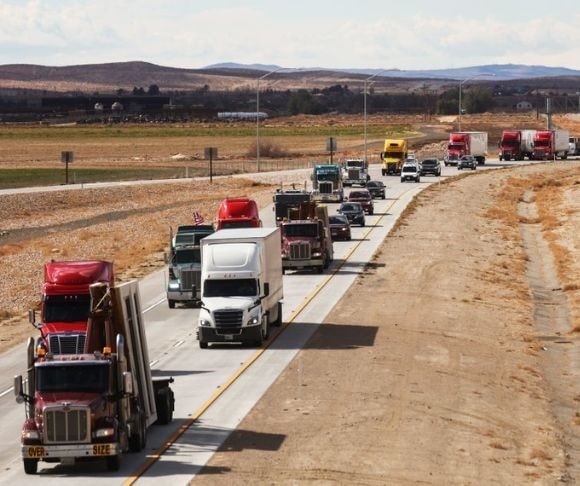
(Photo by Mario Tama/Getty Images)
Professional long-haul California truckers have been fired up for months on end, protesting unfair mandates and regulations imposed by federal, state, and local government agencies. But those protests have reached a fevered pitch as the Golden State’s controversial Assembly Bill 5 law finally goes into effect. The law, AB5, passed in 2019 but has been held up by court challenges from the California Trucking Association, giving the industry a false sense of hope. That all came to a grinding halt when the US Supreme Court decided not to even hear the complaint.
Designed to regulate companies that hire gig workers in large numbers, it requires companies to reclassify freelance and contract workers as employees. Having 70,000 truck owner-operators in the Golden State doubling down on efforts to make a stink, pandemic supply chain problems might seem like a minor inconvenience by comparison.
There really is nothing like an already overtaxed, over-regulated US state spending Assembly time creating another chokepoint in the supply chain to get the blood boiling. About 70% of this nation’s truckers serve in three of the largest US ports: Los Angeles, Oakland, and Long Beach. And a strike coinciding with back-to-school buying, the harvest, and construction and retailers loading up on holiday goods and supplies is probably the worst time for the American consumer. But who can blame the California Truckers?
Add insult to injury; railroad workers and dockworkers are in negotiations with their employers for new contracts. Snarling traffic seems to be a common goal of California’s powers-that-be.
Exemptions Galore But Not for California Truckers
What makes the AB5 law anger the trucking industry is how they were singled out when other transportation sectors won an exemption to the rule. The idea was to target the big independent contractors: gig-economy giants like Uber, Lyft, and DoorDash. Oh, and it should also be mentioned that realtors, accountants, and attorneys squeaked by with immunity from the statute. Those not absolved of AB5?: Freelance writers, translators, artists, and consultants in the state. How does California choose who to target and who gets the free pass?

(Photo by Mario Tama/Getty Images)
Larry Gross, the president and founder of Gross Transportation Consulting, predicts an unpleasant next several months if something isn’t done to appease the trucking industry: “So, you can imagine if there’s a stoppage, it’s kinda like a crimp in a hose and the water is going to back up very quickly. It’s not going to take a long time of this type of disruption before it’s going to break at least the Port of Oakland.”
But independent trucker Mohander Singh told one local news outlet that he and his colleagues have no beef with Port of Oakland officials; just the law itself: “We don’t have an issue with the port; our fight is with our government.”
The message from the independents is the same as Kimberly Sulsar-Campos, vice president of Oakland-based Iraheta Bros. Trucking: “The truckers want an exemption, and they’re not stopping until they get it.” And what should concern California lawmakers is that a great many union members support the protesting owner-operators:
According to an industry news organization, FreightWaves, approximately 22,000 members of the International Longshore and Warehouse Union (ILWU) are quietly supporting their colleagues. The publication interviewed several ILWU on-site at the Port of Oakland. One member, George, who wanted his last name kept anonymous, stated, “We are working without a contract right now, so we support the owner-operators and understand what they are trying to do.”
Oh, Gavin, Come Out to Play

Gavin Newsom (Aric Crabb/MediaNews Group/East Bay Times via Getty Images)
The industry demands that Gov. Newsom allow California truckers the freedom from this law that the other transportation-oriented businesses have been granted. And until some leeway is bestowed, or at the very least, renegotiated, all bets are off on how Americans will send kids back to school and whether there is a big turkey on the platter for thanksgiving.
In the long run, AB5 may drive even more middle-class folks out of California. As Kevin McMaster of Encinitas, CA-based Flock Freight warns, “This would cause a ripple effect in the industry, pushing many drivers who don’t want to apply for their own authority to lease out of state, likely in Arizona or Nevada, and even force some into retirement due to increased market pressures. There will likely be pressure added on capacity in California that could exacerbate an already tough environment where drivers are at a premium.”
And the American consumer will continue to pay the ultimate price.
Remember to check out the web’s best conservative news aggregator
Whatfinger.com — the #1 Alternative to the Drudge


